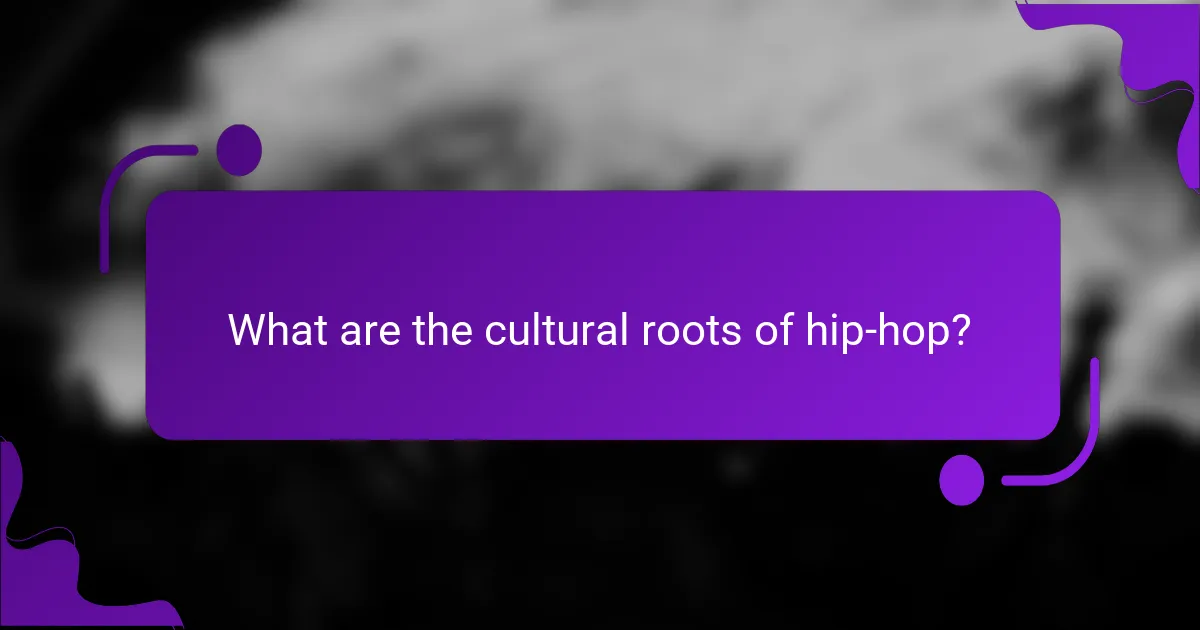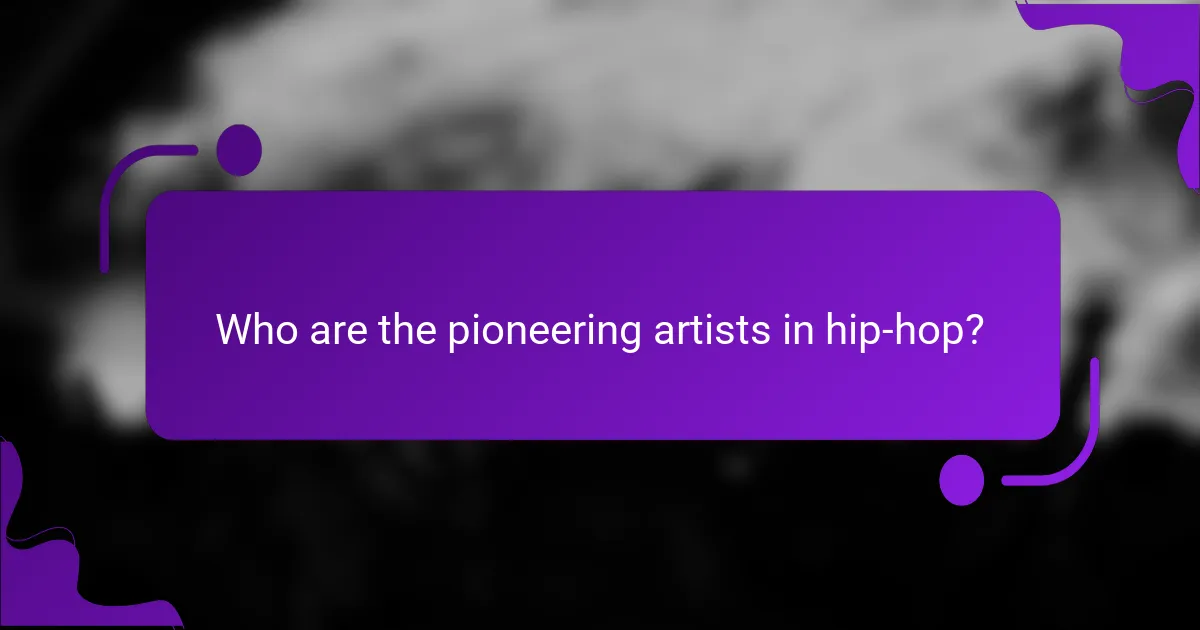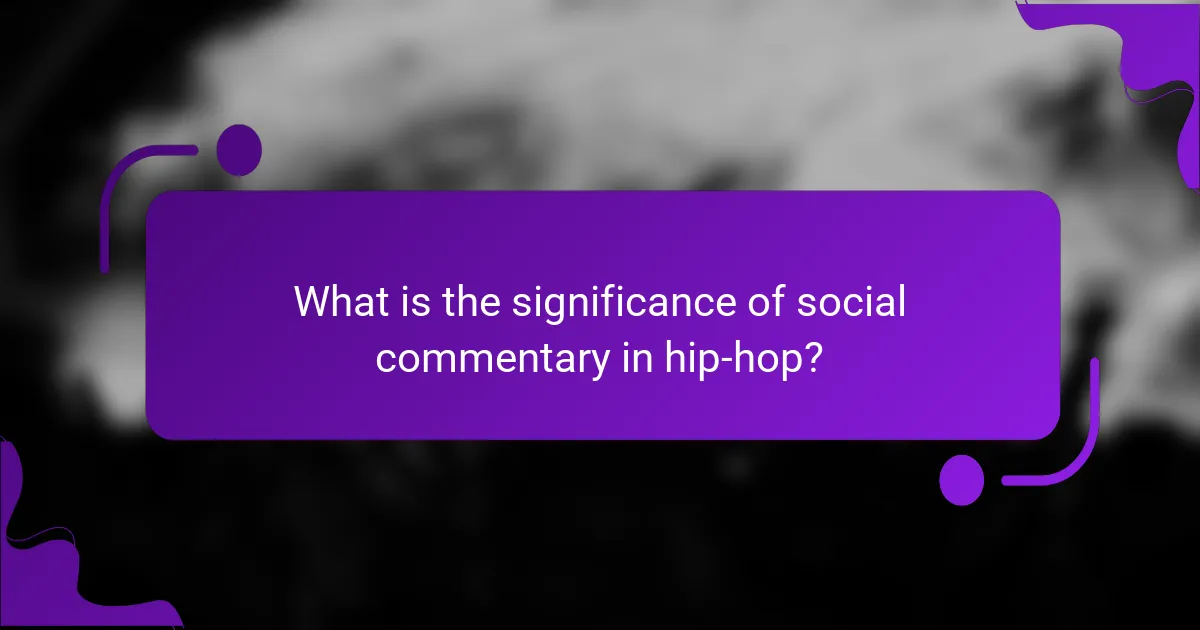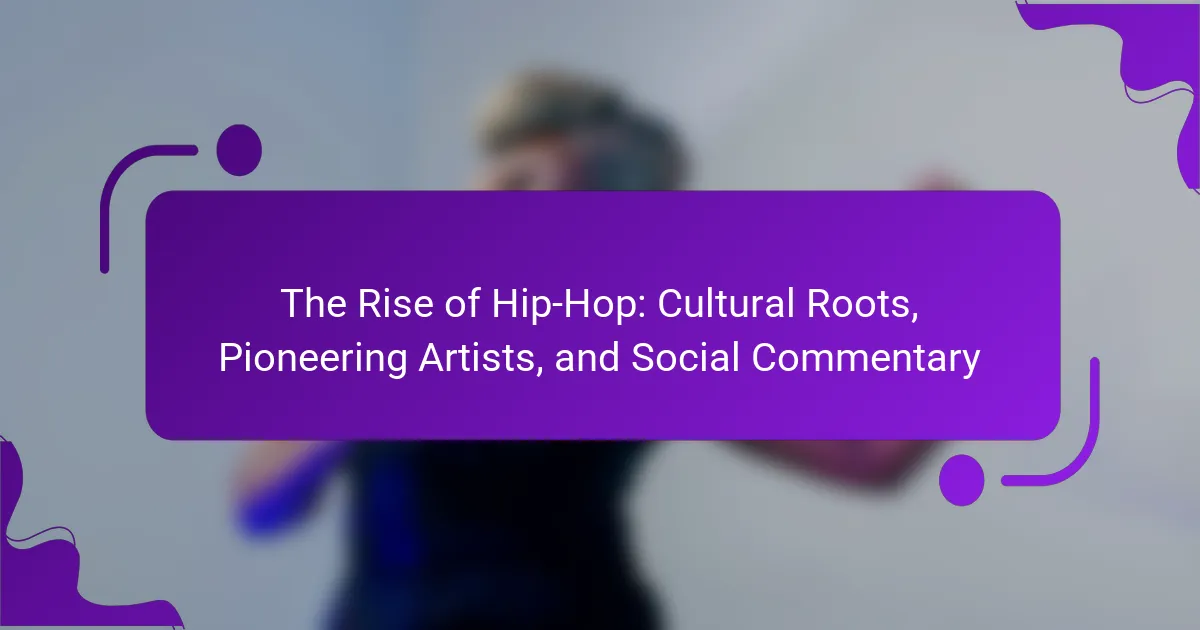Hip-hop is a cultural and musical genre that originated in the African American and Latino communities of the Bronx in the 1970s, emerging as a response to social, economic, and political challenges. Influenced by African traditions, funk, soul, and disco, it developed through block parties and DJing, with pioneering artists like DJ Kool Herc, Grandmaster Flash, and Afrika Bambaataa shaping its sound and culture. The genre serves as a significant platform for social commentary, addressing issues such as racism, poverty, and police brutality through impactful lyrics. Hip-hop has evolved into a global phenomenon, influencing various art forms and fostering awareness and activism within marginalized communities.

What are the cultural roots of hip-hop?
Hip-hop originated in the African American and Latino communities of the Bronx in the 1970s. It emerged as a response to social, economic, and political challenges. The cultural roots include influences from African traditions, such as storytelling and rhythm. Additionally, hip-hop draws from funk, soul, and disco music. Block parties and DJing were pivotal in its development. Key figures like DJ Kool Herc played a significant role in shaping its sound. The genre also reflects the struggles and aspirations of marginalized communities. Hip-hop has since evolved into a global phenomenon, influencing various art forms and cultures.
How did hip-hop emerge from its historical context?
Hip-hop emerged from its historical context as a response to socio-economic challenges faced by marginalized communities in the 1970s. The genre originated in the South Bronx, New York City, during a time of urban decay and economic hardship. African American and Latino youth sought a platform to express their frustrations and creativity. Block parties became common, where DJs mixed music and MCs rapped over beats. This cultural movement was influenced by previous musical styles like funk, soul, and disco. The first hip-hop party is credited to DJ Kool Herc in 1973. The genre quickly gained popularity, leading to the establishment of hip-hop as a dominant cultural force. By the late 1980s, hip-hop began to address social issues, further solidifying its role as a voice for the oppressed.
What socio-economic factors influenced the birth of hip-hop?
The birth of hip-hop was influenced by socio-economic factors such as poverty, urban decay, and systemic inequality. In the 1970s, South Bronx neighborhoods faced high unemployment rates and inadequate housing. These conditions fostered a sense of community among marginalized youth. Economic hardship led to creative expression as a means of coping. The lack of resources prompted innovation in music and dance. Local block parties became platforms for emerging artists. DJs and MCs utilized turntables and microphones to create unique sounds. This grassroots movement reflected the struggles and aspirations of the community. The socio-economic landscape shaped the themes and messages in hip-hop culture.
How did the African American experience shape hip-hop culture?
The African American experience significantly shaped hip-hop culture. Hip-hop emerged in the 1970s in the Bronx, New York, as a response to socioeconomic struggles faced by African Americans. This cultural movement reflected their realities, including poverty, systemic racism, and urban life. Key elements of hip-hop, such as rapping and DJing, were influenced by African American oral traditions and musical styles. The genre provided a platform for storytelling and social commentary on issues like police brutality and inequality. Artists like Grandmaster Flash and Afrika Bambaataa used hip-hop to unite communities and promote empowerment. The cultural impact of hip-hop continues to resonate globally, rooted in the African American experience.
What role did music genres play in the development of hip-hop?
Music genres significantly influenced the development of hip-hop. Early hip-hop emerged in the 1970s, drawing from funk, soul, and disco. Funk provided the rhythmic foundation with its strong bass lines and grooves. Soul contributed emotional depth through its vocal styles and lyrical content. Disco introduced danceable beats that made hip-hop appealing in party settings.
Additionally, reggae and rock music impacted hip-hop through unique rhythms and styles. Reggae’s use of toasting influenced rapping techniques. Rock introduced elements of rebellion and attitude, shaping hip-hop’s identity.
As hip-hop evolved, it incorporated diverse genres like jazz, blues, and electronic music. This fusion expanded hip-hop’s reach and creativity. The interplay of these genres helped establish hip-hop as a dynamic cultural movement.
Which musical styles contributed to the formation of hip-hop?
Hip-hop was formed from several musical styles. Key contributors include funk, soul, jazz, and reggae. Funk provided rhythmic grooves essential for hip-hop beats. Soul music influenced the emotional expression in lyrics and delivery. Jazz introduced improvisation and complex rhythms, enriching hip-hop’s musicality. Reggae added a distinct rhythmic style and social consciousness. These genres combined to shape hip-hop’s unique sound and cultural identity.
How did DJs and turntablism influence hip-hop’s sound?
DJs and turntablism significantly shaped hip-hop’s sound by introducing innovative techniques and styles. DJs used turntables to manipulate records, creating new beats and rhythms. This practice laid the foundation for hip-hop’s distinctive sound. The use of scratching and beat juggling became essential elements of hip-hop music. Pioneering DJs like Kool Herc and Grandmaster Flash showcased these techniques in the 1970s. Their performances emphasized breaks, allowing MCs to rap over extended instrumental sections. This interaction between DJs and MCs defined the genre’s early development. The blending of various musical genres further enriched hip-hop’s sound. Overall, DJs and turntablism established the sonic landscape of hip-hop, influencing countless artists and styles that followed.

Who are the pioneering artists in hip-hop?
The pioneering artists in hip-hop include DJ Kool Herc, Grandmaster Flash, and Afrika Bambaataa. DJ Kool Herc is known for his innovative use of breakbeats at parties in the Bronx during the 1970s. Grandmaster Flash advanced DJ techniques, including the backspin and punch phrasing, which shaped the sound of hip-hop. Afrika Bambaataa is credited with popularizing hip-hop culture and coining the term “hip-hop.” These artists laid the foundation for the genre, influencing countless musicians and shaping the cultural landscape of hip-hop. Their contributions are recognized in the Rock and Roll Hall of Fame and other significant cultural institutions.
What impact did early hip-hop artists have on the genre?
Early hip-hop artists significantly shaped the genre by introducing innovative styles and social commentary. They pioneered techniques like rapping and beatboxing, which became foundational elements of hip-hop. Artists such as DJ Kool Herc and Grandmaster Flash influenced the use of turntables and mixing. They also brought attention to social issues, reflecting the struggles of marginalized communities. Their work laid the groundwork for future artists and expanded hip-hop’s cultural relevance. The emergence of groups like Run-D.M.C. and Public Enemy further solidified hip-hop’s place in mainstream music. These artists demonstrated hip-hop’s potential as a platform for political expression and cultural identity. Their contributions established hip-hop as a powerful voice in popular culture.
Who are considered the foundational figures in hip-hop history?
DJ Kool Herc, Afrika Bambaataa, and Grandmaster Flash are considered foundational figures in hip-hop history. DJ Kool Herc is credited with originating breakbeat DJing. His parties in the Bronx during the early 1970s laid the groundwork for hip-hop culture. Afrika Bambaataa is known for his role in promoting hip-hop as a cultural movement. He founded the Zulu Nation, emphasizing peace and unity. Grandmaster Flash is recognized for his innovative DJ techniques, including the backspin and punch phrasing. These artists significantly influenced the development of hip-hop music and culture. Their contributions established the genre’s foundations and inspired future generations.
What contributions did these artists make to the culture?
These artists significantly shaped hip-hop culture through their innovative music and social commentary. They introduced new lyrical styles that influenced language and expression in urban communities. Their work often addressed social issues, such as racism and poverty, raising awareness and fostering dialogue. Many artists also contributed to the visual arts, creating iconic album covers and graffiti that became synonymous with hip-hop culture. Collaborations across genres expanded hip-hop’s reach, blending influences and attracting diverse audiences. Their performances brought communities together, creating a sense of belonging and identity. The impact of these artists continues to resonate, inspiring new generations and shaping contemporary music and culture.
How did regional styles shape the evolution of hip-hop?
Regional styles significantly influenced the evolution of hip-hop by introducing diverse sounds and lyrical themes. Each region developed its unique identity, reflecting local culture and social issues. For instance, East Coast hip-hop emphasized complex lyricism and storytelling, with artists like Nas and The Notorious B.I.G. leading the way. In contrast, West Coast hip-hop popularized laid-back beats and gangsta rap, with figures like Dr. Dre and Snoop Dogg defining its sound. Southern hip-hop brought a distinct rhythm and bounce, with artists like OutKast and Lil Wayne showcasing the region’s creativity. These regional differences contributed to hip-hop’s growth, creating a rich tapestry of styles that appealed to various audiences. The interaction between these styles also fostered collaboration and innovation, pushing the genre forward.
What are the key characteristics of East Coast hip-hop?
East Coast hip-hop is characterized by its complex lyricism and storytelling. This subgenre often emphasizes intricate wordplay and social commentary. The beats are typically sample-heavy, drawing from jazz, soul, and funk influences. Artists like Nas and The Notorious B.I.G. exemplify this lyrical depth and narrative style. The sound is often darker and more aggressive compared to West Coast hip-hop. Cultural references to urban life and struggles are prevalent in the lyrics. The genre also played a significant role in the evolution of hip-hop culture in the 1980s and 1990s. Key figures from this era include Run-D.M.C. and Wu-Tang Clan, who contributed to its distinct identity.
How did West Coast hip-hop develop its unique identity?
West Coast hip-hop developed its unique identity through distinct musical styles and cultural influences. The region embraced funk, soul, and jazz, shaping its sound. Pioneering artists like N.W.A and Dr. Dre popularized gangsta rap, reflecting urban life and social issues. The laid-back West Coast vibe contrasted with East Coast hip-hop’s aggressive tone. The emergence of G-funk in the early 1990s further defined the genre, characterized by synthesizers and slow, heavy beats. The cultural backdrop of Los Angeles, including the influence of the Crips and Bloods, added to its narrative depth. West Coast hip-hop also prioritized storytelling, often addressing themes of struggle and resilience. This combination of musical innovation and cultural context solidified its unique identity within the broader hip-hop movement.

What is the significance of social commentary in hip-hop?
Social commentary in hip-hop is significant for its role in addressing social issues. It serves as a platform for marginalized voices. Artists use their lyrics to highlight systemic injustices. Topics often include racism, poverty, and police brutality. For example, songs like “Fight the Power” by Public Enemy confront racial inequality. This genre reflects the lived experiences of communities. It fosters awareness and encourages activism among listeners. Historically, hip-hop has influenced social movements, such as Black Lives Matter.
How does hip-hop address social and political issues?
Hip-hop addresses social and political issues through lyrical content and cultural expression. Artists often use their platform to highlight systemic injustices. For example, songs like “Fight the Power” by Public Enemy confront racism and inequality. The genre serves as a voice for marginalized communities. Many hip-hop tracks discuss police brutality and economic disparity. The genre’s history is rooted in social commentary, originating from the struggles of African American communities. Hip-hop has influenced movements like Black Lives Matter, amplifying calls for justice. Lyrics often reflect real-life experiences, making the issues relatable and urgent.
What themes are commonly explored in hip-hop lyrics?
Common themes explored in hip-hop lyrics include social justice, personal struggle, and cultural identity. Social justice themes often address systemic inequality and racism. Personal struggle reflects artists’ experiences with hardship and resilience. Cultural identity explores heritage, community, and pride in one’s background. Additionally, themes of wealth and success are prevalent, showcasing aspirations and materialism. Relationships and love are also significant, providing emotional depth. These themes resonate with audiences, reflecting real-life experiences and societal issues.
How has hip-hop served as a platform for activism?
Hip-hop has served as a platform for activism by addressing social issues and injustices. Artists use their music to highlight systemic racism, police brutality, and economic inequality. Songs like “Fight the Power” by Public Enemy and “Alright” by Kendrick Lamar exemplify this activism. These tracks encourage listeners to engage in social change. Hip-hop culture promotes community organizing and awareness. Events like the “Hip-Hop for Change” initiative further illustrate this commitment. The genre has a history of political engagement, dating back to the 1980s. Through lyrics, performances, and public appearances, hip-hop artists amplify marginalized voices. This impact has led to increased visibility for civil rights movements.
What are the implications of hip-hop’s social commentary on society?
Hip-hop’s social commentary significantly influences society by addressing systemic issues. It raises awareness about poverty, racism, and inequality. Artists like Public Enemy and Kendrick Lamar use their platforms to highlight these injustices. Their lyrics often reflect the struggles of marginalized communities. This commentary fosters dialogue and encourages activism among listeners. Research shows that music can shape social attitudes and behaviors. A study by the University of California found that hip-hop can inspire political engagement. Thus, hip-hop serves as a powerful tool for social change.
How does hip-hop influence public perception of social issues?
Hip-hop influences public perception of social issues by amplifying marginalized voices and highlighting systemic injustices. Through lyrics and storytelling, artists address topics like racism, poverty, and police brutality. For example, songs like “Fight the Power” by Public Enemy challenge societal norms and encourage activism. Research indicates that hip-hop can shape attitudes and inspire movements, such as the Black Lives Matter movement. A study by the University of Southern California found that hip-hop music significantly impacts listeners’ views on social justice. Thus, hip-hop serves as a powerful medium for social commentary and change.
In what ways has hip-hop contributed to social change?
Hip-hop has contributed to social change by amplifying marginalized voices and addressing systemic issues. It serves as a platform for discussing racism, poverty, and inequality. Artists like Public Enemy and N.W.A. have highlighted police brutality and social injustices in their lyrics. The genre has mobilized communities for activism, such as the “Black Lives Matter” movement. Hip-hop culture has also influenced public policy discussions, promoting awareness of social issues. Events like the “Hip-Hop Summit Action Network” have united artists and activists for social causes. Furthermore, hip-hop education programs have emerged, teaching youth about social justice and empowerment. This impact is evident in various social movements that have drawn inspiration from hip-hop’s messages and artistry.
What can listeners learn from hip-hop’s cultural narratives?
Listeners can learn about social issues and personal struggles through hip-hop’s cultural narratives. These narratives often address themes like poverty, racism, and identity. Artists use storytelling to share their lived experiences. This provides insight into the challenges faced by marginalized communities. Historical context is frequently embedded in lyrics, offering lessons on resilience and activism. For example, tracks like “Fight the Power” by Public Enemy highlight systemic oppression. Additionally, hip-hop promotes cultural pride and community solidarity. Through these narratives, listeners gain empathy and understanding of diverse perspectives.
The main entity of the article is hip-hop, a cultural movement that originated in the 1970s within the African American and Latino communities of the Bronx. The article explores hip-hop’s cultural roots, tracing its influences from African traditions, funk, soul, and disco music, as well as the socio-economic factors that contributed to its emergence. It highlights pioneering artists such as DJ Kool Herc, Grandmaster Flash, and Afrika Bambaataa, who played critical roles in shaping the genre. Additionally, the article examines hip-hop’s significant social commentary, addressing issues like racism, poverty, and police brutality, and its impact on activism and public perception of social issues.
